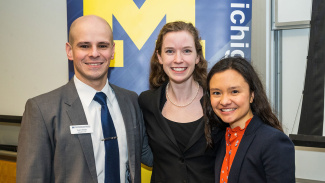Michigan Ross MBA’s SlumberFlow Took Home $25,000 Prize at Student Startup Competition

Following their top finish at the Michigan Business Challenge earlier this year, the SlumberFlow team successfully pitched their venture virtually at the Rice Business Plan Competition in June.
The team — consisting of Michigan Ross student Juan Noda, MBA/MD ’20; and fellow University of Michigan graduate students Allison Powell, MSE ’16/MD ’21; and Lindsey Furness, BSE/MSE ’21 — won the $25,000 Pediatric Device Prize from the Southwest National Pediatric Device Consortium during the competition.
SlumberFlow is a startup that designs and manufactures a device that reduces the negative effects of obstructive sleep apnea caused by upper airway obstruction.
The idea for SlumberFlow originated from Powell, who saw a patient experiencing severe obstructive sleep apnea during a research year of her medical school studies. She recognized a need for a non-invasive, easy-to-use nasal airway device.
“As a current medical student at U-M, Powell used her background in biomedical engineering to develop an improved securement device to bypass the obstruction,” said Noda, who was working with Powell in a lab at the time. “Our team of physicians and engineers then worked closely with amazing patients and caregivers to finalize the device.”
The SlumberFlow team then decided to enter the 2020 Michigan Business Challenge, a campuswide, multi-round business plan competition hosted by the Zell Lurie Institute. During the competition, the team impressed the judges, earning a $15,000 prize for taking first place in the Invention Track. They also won first place in the elevator pitch competition and the $5,000 Williamson Award for outstanding business and engineering team.
Support from the Zell Lurie Institute
Throughout their startup journey, ZLI has continued to provide an abundance of resources to SlumberFlow, including entrepreneurial advising, presentation and pitch coaching, and faculty-led workshops.
ZLI also helped Noda and his teammates prepare for the Rice Business Plan Competition. Anne Perigo, associate director of ZLI, met with the team several times to ensure that they were covering the information that investors wanted to see in an attractive way.
“ZLI was very helpful in refining our pitch and our slides.” said Noda. “Anne’s guidance and perspective was invaluable when we were preparing for the Rice Business Plan Competition, where she met with us virtually regularly heading into the pitch competition. ZLI and Anne really made us dig in to difficult questions and challenge us to be even more prepared.”
Noda said his MAP (Multidisciplinary Action Projects) experience was pivotal to his team’s success at MBC and the Rice Business Plan Competition. “The experience of developing a market entry strategy for a medical device startup was directly applicable to SlumberFlow, just in a different market,” he explained.
In addition, Noda said his core MBA classes and the Comprehensive Health Care Strategy course gave him a great foundation for developing the SlumberFlow business strategy.
He also believes the interdisciplinary makeup of the team is a significant factor in SlumberFlow’s success at business challenges this year.
“Our background as students in medicine and engineering gave us the ability to accurately explain how SlumberFlow works. We then could collaborate directly with Michigan Medicine faculty and patients,” he said.
ZLI is continuing to help the SlumberFlow team with the next steps in developing their product through customer discovery, business model exploration, mentorship, funding opportunities, and more.
SlumberFlow plans to move forward with a clinical trial to expand on the results they have achieved with their initial patient cohort. The team has been successful in accessing funding through the Coulter Translational Research Program at U-M Biomedical Engineering, where their product is still in development.







